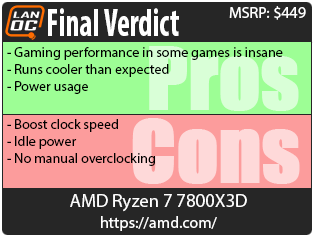Overall and Final Verdict
The initial 7950X3D and 7900X3D launch was exciting but there were a lot of people, myself included, that had the launch date for the Ryzen 7 7800X3D marked down. It’s not that the crazy high-end flagships aren’t exciting, but if gaming is your only focus it is not only a waste of money but sometimes it can even mean less performance for gaming. The Ryzen 7 7800X3D on the other hand is the successor to the 5800X3D which has been extremely popular for gamers whereas the two other CPUs with their higher core counts and their asymmetric chiplet design have more of a focus on content creation and raw processing power and the asymmetric chiplet design complicates things as well. So how did the 7800X3D end up performing? Well if you are a gamer and your focus is on gaming performance, its performance is impressive. Like with the other 3D V-Stacked Cache CPUs there are games where it doesn’t benefit but when it does it matches and sometimes beats the performance of the 7950X3D. The flip side of that though is because the 7800X3D has a lower boost clock speed and fewer cores than the 7950X3D and 7900X3D in clock speed dependent applications it runs near the bottom of the 7000 Series product stack. In most of those tests, it sits between the 7600X and the 7700. In other words, if you will need top-level performance in applications beyond gaming the higher-end 3D CPUs might be the better option, or even cheaper CPUs like the 7700X. So there is a big tradeoff in performance that you will have to consider.
Beyond that, I was surprised that the Ryzen 7 7800X3D ended up running cooler than expected and its power draw in our power tests was an improvement as well. Most likely from its lower boost clock. Like the other 7000 Series Ryzen CPUs, its idle power usage was still higher than past generations and Intel’s offerings. Also if you are going in thinking that the boost clock can just be fixed with an overclock, you do have a few auto overclock options but full manual overclocking is locked down just like the 7950X3D, 7900X3D, and the 5800X3D.
For pricing, the Ryzen 7 7800X3D has an MSRP of $449 which is exactly what the last generation 5800X3D was priced at and up until now has been the go-to gaming CPU. This is $250 less than the 7950X3D and $150 less than the 7900X3D. But when it comes to standard non-gaming performance it does run in between the $299 7600X and $329 7700 so the gaming performance premium is $120+ and given just how well it performs in those situations I would say the extra money is worth it. I would still love to see something in between the 7800X3D and the 7900X3D with the same single chiplet design but with the higher boost clock that the 7950X3D and 7900X3D have, but as it sits this is still a monster gaming CPU.


Live Pricing: HERE




